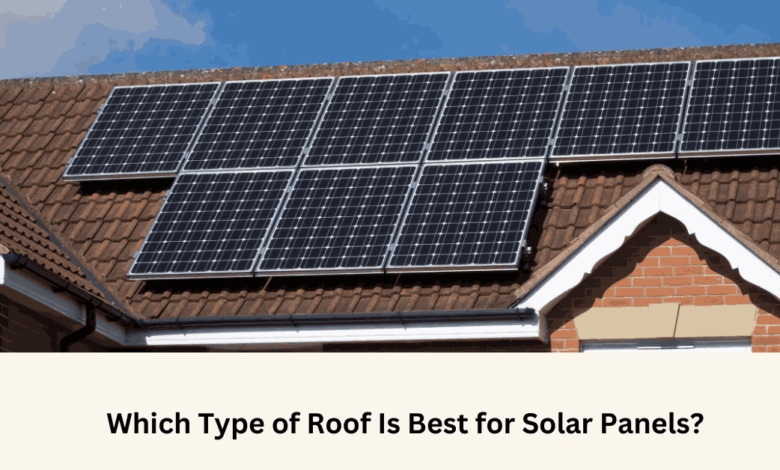Which Type of Roof Is Best for Solar Panels?

Solar panels can be a great addition to your home due to their affordability and reliability. They are eco-friendly and can help you save on your electricity bill.
Choosing the right roof for solar panels can impact its longevity and efficiency, and solar contractors can help you choose the best roof for solar panels. Here are four types of roofing materials that are compatible with solar panels:
1. Tile Roofs
Tile roofs, or clay roofs, are a great option due to their excellent insulation properties and durability. They resist harsh weather conditions, providing a secure and stable foundation for panels long term. Tiles are compatible with most solar panel mounting systems, allowing solar contractors to use various installation techniques.
They require proper anchorage for tiles to withstand the additional weight from the solar panel system. Tiles come in different styles and colors, allowing the homeowner to maintain their home’s visual integrity, even with solar panel installation.
2. Metal roofs
Metal roofing is compatible with solar panels due to its ability to withstand harsh weather conditions, energy efficiency, and low maintenance. The durable material provides a sturdy foundation for solar panel installation. The ability to withstand extreme climate conditions provides a secure area for solar panels.
Metal roofs have a high reflective rate, reducing the heat. Lower temperatures allow solar panels to operate more efficiently. Metal roofs are compatible with different solar mounting systems since the racking system can be easily installed.
3. Asphalt Shingle Roofs
These roofs are made of asphalt shingles and other asphalt materials and components. They are common due to their affordability, energy efficiency, design variety, versatility, and impact resistance. Solar contractors can easily install solar panels on these roofs due to their light weight.
Their ability to resist impact protects solar panels from heavy rain and wind damage. The durability feature allows asphalt shingles to support long-term solar performance.
Also, their design makes them compatible with most solar panel mounting systems. Professionals can easily install solar racking systems on this type of roof, providing a stable foundation for solar panels.
4. Tar and Gravel Roofs
Tar and gravel roofs or built-up roofs (BUR) are a common type of flat roofing material. It is budget-friendly and has a long lifespan.
BURs are suitable for solar panels due to their durability, energy efficiency, and sturdy, and flat composition. The flat surface simplifies the solar installation process and leads to uniform placement of solar panels.
The gravel layer provides a sturdy ground for solar panels during harsh weather conditions. With professional solar contractors, BUR can offer reliable surfaces for solar energy systems.
Factors That Influence Solar Panel Efficiency
Here are three factors that affect solar efficiency:
1. Roof Pitch
Roof pitch is the angle of your roof. It influences how much light solar panels can absorb. A steeper roof provides solar panels with maximum exposure to sunlight. Homeowners with steep roofs may experience higher levels of solar efficiency than those with low or flat pitch. A flat pitch may need additional support to adjust the roof angle.
2. Roof Orientation
Roof orientation is the direction your roof faces. It determines the amount of sunlight the solar panels receive. Certain roofs expose solar panels to maximum sunlight, enhancing their efficiency.
3. Shade and Obstructions
Solar panels can work best in total sunlight exposure. Any nearby shade and obstacles like trees and buildings hinder panels from absorbing maximum sunlight. This leads to less power generation. Clear any obstacles and shade before solar installation to allow maximum solar exposure.
Contact Solar Contractors Today
Choosing the right type of roof can enhance the effectiveness of the solar panel system. Asphalt shingles, metal, tile, tar, and gravel are examples of roofs compatible with solar panels.
Factors such as roof pitch, orientation, shade, and obstructions can affect the efficiency of solar panels. Consult a professional solar contractor to evaluate your roof’s compatibility with solar panels before installation.




